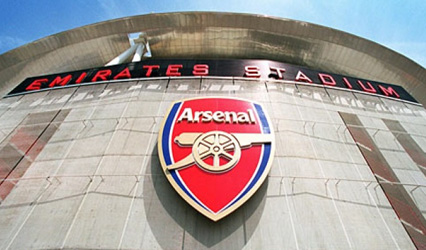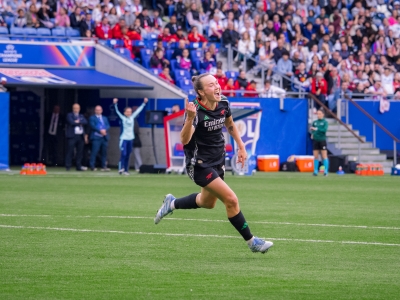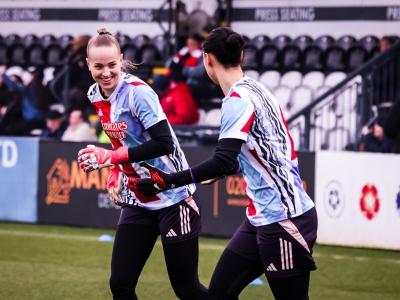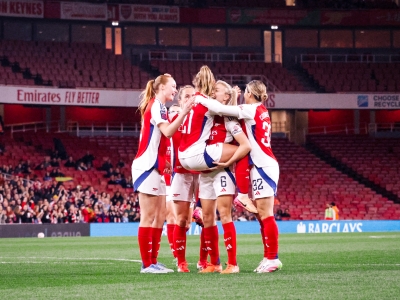David Dein has been marginalized on the Arsenal board for some years now. This was the man who would have preferred the club to be the tenants at the new Wembley instead of remaining in Islington at Ashburton Grove. However, his brief on the board is playing matters, and he’s done a pretty good job on that front, given the success the club have achieved on a modest budget. However, whilst incurring the stadium building cost of the last four years, gradually, the team have become lesser contenders than they were when there was slightly more in the transfer budget. The summer of 2001 saw Arsenal spend heavily, with a resultant double. A further three trophies in each of the successive seasons were due to a mixture of previous investment in players and astute purchasing as the board’s ability to fund the purchase of proven talent became more and more restricted.
Arsene Wenger is not the kind of manager to contradict board statements, and indeed neither is Dein. But it is known that the latter has become very frustrated with the financial situation at Arsenal in terms of the money available to buy players. In truth, despite the official line and the balance books, there was nothing available in January to spend. The board were playing safe with any excess money they had over and above the March 2007 £33 million interest repayment in case of the team failing to progress in this season’s Champions League and indeed not even making it into next season’s tournament. Think of a young couple with a mortgage who have heard whispers at work that the company might be letting a few people go soon. They’d stop going out and spending money in case they might be looking for jobs and have no income for a period. And this despite the capacity crowds for the first season at the new stadium.
Dein’s brief might be playing matters, but it’s also where his heart is as far as Arsenal’s concerned. He’ll be delighted his shares are worth what they are due to the stadium move (although also quietly mindful of how much the shares he sold to his then-mate Danny Fiszman are now worth), but in reality, he doesn’t care too much to think of the financial balancing act the rest of the board proritise. He wants to see money spent on the team in the same way that fans do. And Dein is a fan. He bought into the club in the early 1980s not as an investment, but because he wanted to have a greater involvement with Arsenal.
Although his influence has been seen on the pitch during the Wenger era, outside of transfer negotiations and player wage issues, the vice-chairman has had little to do with off-field matters at the club, busying himself with his roles at the FA, UEFA and now G14. The power he yields was reflected by the board knocking back the £60,000 a week deal he agreed with Ashley Cole’s agent, with the motorway swerve and infamous fall out that followed. Now that his loss of positions at the first two organisations have thwarted ambitions to rise to the top of football’s political tree, his focus has returned to north London and his first football love. And the arrival of Stan Kroenke on the scene has been well timed in this regard.
It seems likely that the shares currently being hoovered up on top of the ITV deal are being purchased on Kroenke’s behalf. Dein could either combine his shareholding with Kroenke to form a power block bigger than any other individual shareholder (allowing Kroenke to buy close to 30% of the club’s shares without being committed to buy the club outright) or he could cash in on his own shareholding by selling to Kroenke in return for retaining his position on any future board should the American decide to buy the club outright as some future time.
Significantly, Kroenke’s own statement on his purchase of the ITV shares values them at £6,800 per share (the rest of the money accounted for by the actually negligible worth of 50% of Arsenal’s broadband venture), and if he were to attempt a takeover at the club, the rules state that he would have to offer shareholders the highest price he had paid for shares over the last 12 months. So in this light, his statement would be prudent in stating the price per share at its lowest possible level (although the Takeover Panel might raise an eyebrow at the value placed on the historically loss-making broadband venture).
However, Dein is well-placed because if Kroenke did buy Arsenal, he would need expertise in place on the football side of things. The business side of the club’s relocation is effectively resolved. The legal and financial complications of the stadium move are history. Now it’s an exercise in balancing the books and debt management. But for all the pronouncements down the years from both the chairman and the managing director about the move not affecting the team on the pitch, we all know that is not the case. So it might be with an equally large dose of salt that we should believe statements that Arsenal can survive and prosper without year on year Champions League involvement or indeed that the break even crowd figure is 32,000 per game (or even 22,000 as stated at the July 2006 EGM, the revision to 32,000 at the subsequent October AGM not exactly inspiring confidence in the board’s analysis of worse cast scenario). Equally critical to Champions League qualification is Premiership position at season’s end, in terms of the split of CL television pot. The winners of the Premiership get substantially more than the team that finishes second, and so on down to fourth. So two fourth placed finishes in a row mean that Arsenal will receive less than the (same) three teams above them from European TV revenue in 2006-2007 and next season. That’s why there’s so much talk from the club about the importance of finishing third.
Bottom line though is that Arsenal need investment in players on the field. The balance is wrong at the moment, with too much emphasis placed on potential. Dein knows this, Wenger knows this. The club are delighted with the press write-ups of a potential golden future, but will the brightest of prospects stick around for it if Champions League football is not a given, and chances of silverware are hampered by a lack of enough top drawer players? Kroenke could help on this front even if he does not buy the club outright. Wenger needs cash. The existing board does not have a lot to give him. Dein is frustrated and Kroenke stands in the wings as a potential source of funds.
Kroenke may bide his time before making an offer for the club outright. But Dein can see the writing on the wall and would see the benefit of siding with the new man. One thing I will predict now. I would be very surprised if a year from now, the board of directors at Arsenal Holdings PLC has not changed in personnel in some respect. In fact, don’t rule out the possibility that David Dein might be the sole survivor from the day when the team lost their unbeaten record in their new home. Due to his loss of influence over recent years he has nothing to lose by striking up an allegiance with the new investor. And if Kroenke wants Wenger to stay at the helm if he does mount a takeover bid, his best chance would be to return Dein to the position of power at the club he previously enjoyed. It is an arrangement that could suit both men just fine.







